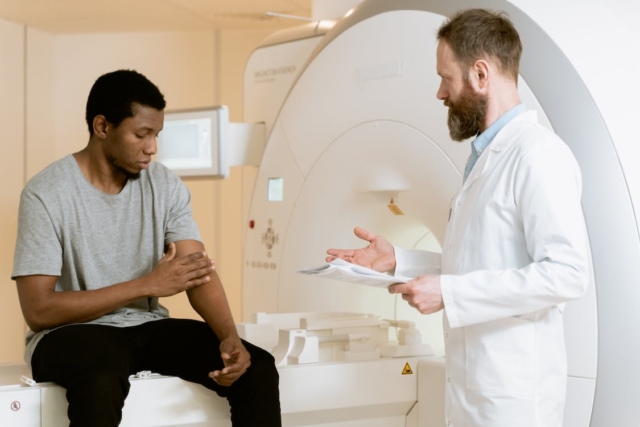5 Tools to Ease Sore Muscles

Living with chronic pain can be a challenging experience. It has the potential to disrupt various areas of your life. Indeed, the longer you have symptoms without relief, the more it can dictate the activities you are able to engage in.
It is, therefore, vital that you gain effective medical attention at the earliest opportunity. This is likely to involve both examinations into the root causes of the pain and management of your immediate symptoms. However, it is not always easy to gain the level of care and attention from doctors that you may need. You may find that you have to advocate for yourself in a clear and confident manner.
This is not always easy, though. Let’s look at how you can effectively advocate for yourself at the doctor’s office when you have chronic pain.
So, why is it important to advocate for yourself at the doctor’s office when you have chronic pain? On the surface, the priority here is to get the treatment you need to navigate your day-to-day life. This may seem like a basic expectation of service for all patients. Unfortunately, you may find that the need for advocacy is particularly necessary with symptoms of chronic pain.
In some instances, the struggle to get effective treatment is because experiences of pain can be entirely subjective. Doctors may take an understandably cautious approach to the treatment of conditions, typically by prescribing pain medication, unless there is clear evidence of the pain. Therefore, patients might need to gain advocacy skills to navigate this.
Unfortunately, there may also be biases involved in doctor-patient interactions. Too many medical professionals still misguidedly think Black patients are less susceptible to pain, with 40% of medical students wrongly believing that Black people’s skin is thicker than white people’s. This causes a disproportionate amount of mistreatment of Black patients in pain. There is also a continued problem with medical professionals frequently dismissing the pain experiences of women. Studies show that the women’s pain is viewed as less intense and more likely to benefit from psychotherapy than pain medication as compared to men expressing pain. Therefore, self-advocacy might be necessary to overcome these harmful biases.

Advocating for yourself at the doctor’s office tends to benefit from preparation. Patients often feel more confident in interacting with professionals when they don’t feel the pressure to simply react to what doctors are telling them. Further, it makes the process less stressful.
From a chronic pain perspective, this can begin with a list of your experiences. It’s not unusual for physicians to find that patients struggle to express symptom details. This can be due to the stress of the situation or simply not having the language to describe pain effectively. Some doctors are skilled in asking open-ended questions during their assessments to help with this.
However, as a patient, it can be wise to take time beforehand to prepare detailed descriptions of your symptoms. You may find it useful to keep a thorough pain diary in the lead-up to your appointments. This allows you to note the times of day you experience pain, the activities you perform that contribute to it, and even a comparison of the severity in different circumstances.
Remember, though, that advocating for yourself can be a stressful experience. Take the time beforehand to perform some self-care activities that help you maintain calm and clarity. You may be able to combine this with mental techniques that help you cope with chronic pain, like listening to music or breathing exercises.
The experience of advocating for yourself by only relying on subjective experiences of pain can be frustrating. Medicine is, after all, a scientific field and doctors will often rely on verifiable facts to dictate treatment. As a patient, one of your most powerful steps for self-advocacy is bridging the gap between your experiences and their need for evidence by using some hard data.
This isn’t to say that you can easily provide verifiable proof of the type and severity of the pain you experience. Instead, you are likely to be more successful in offering evidence of how the severity of your pain genuinely impacts your quality of life. This may include disrupted sleep patterns, blood pressure fluctuations, or heart-rate spikes at times you experience pain.
Gaining hard data on this is increasingly practical. Emerging 5G networks are transforming how wearables play key roles in our lives. In the near future, ultra-low latency connectivity will likely mean the healthcare industry will be able to gather reliable real-time data from patients’ mobile technology. But even now, you can collect informative evidence using smartwatches and fitness trackers. You can pair the data you gather on your sleep disruptions and other vital signs with notes in your pain diary to present to your doctor.

Advocating for yourself when you have chronic pain can often feel like a lonely experience. The idea of you needing to debate with a medical professional can be daunting. However, you don’t necessarily need to go it alone.
If possible, find a trusted friend or family member who can support you in your advocacy efforts and perhaps accompany you to appointments. They may be able to help you transcribe your symptoms so you can clearly communicate these to your doctor. In some instances, their presence may provide a vital calming influence in difficult situations.
Nevertheless, it’s important to be clear on the role they’ll play during your appointments. This prevents confusion and frustration for you, your support person, and your doctor. Agree on actions you’re comfortable with them taking and set boundaries wherever necessary. They should be there for your support and empowerment, not to advocate for you.
There may be various reasons you need to advocate for yourself at the doctor’s office in relation to your chronic pain experiences. Wherever possible, prepare for your appointments with details of your symptoms. Offering hard data from wearable devices can also help support your subjective descriptions. In some circumstances, a trusted friend or family member can provide positive support for your efforts. You deserve to receive a high level of treatment and considerate care. It’s worth taking solid steps to be your own best advocate.
Do you keep struggling with longterm health problems? Take a look at this step-by-step guide to help you navigate each phase of getting diagnosed with a chronic illness.